Farmer Led Innovator Field Walks
Maine Reduced Tillage Field Walk at Goranson Farm and Crystal Spring Farm
Date: October 15, 2024, Dresden and Brunswick, ME
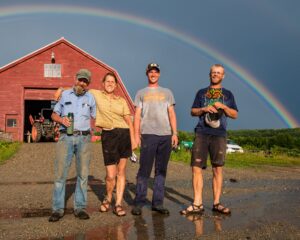 Join us for a field walk to discuss the challenges of reducing tillage at Goranson Farm and Crystal Spring Farm. Both of these farms have been experimenting with equipment and techniques to cut down on tillage intensity, reduce the number of passes, or utilize cover crops to reduce tillage. You can come to one farm, or both!
Join us for a field walk to discuss the challenges of reducing tillage at Goranson Farm and Crystal Spring Farm. Both of these farms have been experimenting with equipment and techniques to cut down on tillage intensity, reduce the number of passes, or utilize cover crops to reduce tillage. You can come to one farm, or both!
Goranson Farm has been experimenting with reducing tillage by using specialized equipment: speed disk and zone tiller. Also, they have front-mounted a tine weeder ahead of seed drill to establish weed-free cover crops. They’ve also been growing fall-planted oats and peas as a living mulch for garlic.
Crystal Spring Farm has been experimenting with planting dates and rates for oat cover crop. The winter-killed residue is. We’ll take time to kick the tires on the no till seed drill.
This field walk will make space to discuss the challenges and the possibilities of scaling up reduced tillage; we hope other farmers will share their own experiences and successes!
Please register below. Bring your own bag lunch; we will provide drinks and cookies.
Goranson Farm cultivates fresh nutritious organic veggies, berries, and maple syrup on 72 acres in beautiful Dresden, Maine. Jan Goranson, Rob Johanson and sons Carl and Göran farm the land that has been in their family, feeding the community, since the 1960’s. They offer products through their farm stand, mail order, area farmers’ markets, and a free choice CSA program.
Seth Kroeck has been growing vegetables organically for 25 years on farms in California, Massachusetts, and New York before settling at Crystal Spring Farm in 2004. Seth and Maura lease the farm from Brunswick-Topsham Land Trust and run the farm business independently. Marketing to wholesale the farm produces certified organic carrots, Brussels sprouts, heritage grains, specialty peppers and wild blueberries. As growers their focus is on reducing their carbon footprint, enhancing biodiversity and nurturing soil health through organic management.
Reduced Tillage Field Walk at Fort Hill Farm
September 17, 4 – 6 pm. Optional pizza dinner 6 – 7 pm.
Fort Hill Farm, 18 Fort Hill Rd, New Milford, CT 06776
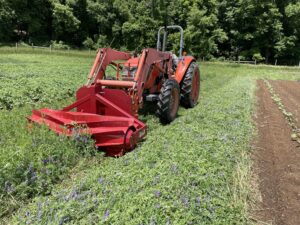 Join us for a field walk to discuss the challenges of reducing tillage at Fort Hill Farm in New Milford, CT. Fort Hill Farm produces 14 acres of certified organic vegetables, herbs, cut flowers, and berries with a focus on building health soils. They use tillage to prepare beds for planting but have recently been experimenting with reducing tillage by transplanting vegetable crops into rolled cover crops and a perennial white clover living mulch. We will discuss the challenges encountered with these two practices, and the possibilities of scaling up reduced tillage based on the small trials they grew out this season. Paul and Rebecca are still on the search for labor efficient no till practices that don’t depend on tarps or herbicides.
Join us for a field walk to discuss the challenges of reducing tillage at Fort Hill Farm in New Milford, CT. Fort Hill Farm produces 14 acres of certified organic vegetables, herbs, cut flowers, and berries with a focus on building health soils. They use tillage to prepare beds for planting but have recently been experimenting with reducing tillage by transplanting vegetable crops into rolled cover crops and a perennial white clover living mulch. We will discuss the challenges encountered with these two practices, and the possibilities of scaling up reduced tillage based on the small trials they grew out this season. Paul and Rebecca are still on the search for labor efficient no till practices that don’t depend on tarps or herbicides.
We’ll also discuss their success using a Great Plains no till drill to plant fall cover crops into flail mowed vegetable crops. We’ll take the time to kick the tires on the no till drill, the roller crimper, and an add-on coulter for a water wheel transplanter.
This field walk will leave plenty of time for discussion and we hope other farmers will share their challenges and successes!
Please register so we have plenty of food! We’ll walk and talk from 4-6 pm and then gather from 6-7 pm for a casual dinner of pizza and veggies.
Fort Hill Farm is a family-run, certified organic, 38-acre farm in the heart of New Milford, CT producing vegetables, herbs, cut flowers, and fruit on 14 acres each season. Since 2002, they’ve used farming practices that promote healthy soils, reduce pests, and protect the environment. Paul Bucciaglia and Rebecca Batchie grow over 35 crops available at their farmstand, two local farmers’ markets, a natural food market, and area restaurants.
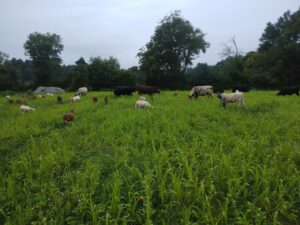 Reduced Tillage Field Walk at Freedom Food Farm
Reduced Tillage Field Walk at Freedom Food Farm
July 30, 2024, 3 – 5 pm
Freedom Food Farm, 471 Leonard St. Raynham, MA
At Freedom Food Farm, Chuck Currie and his team are building the soil’s top mulch layer through a combination of transferred mulch and successive cover crops. They use a no-till drill to seed cover crops, and then terminate by either mowing, rolling, or tarping. Transplants are set using a water wheel transplanter with a no-till attachment. Additional green chop mulch is added to some crops for additional weed control and fertility. This approach combines transferred mulch practices, no-till residue management, and cover crop succession to maximize the potential benefits of high residues for weed suppression, soil health and soil moisture conservation.
Chuck will discuss the challenges and successes of this system, demonstrate key pieces of equipment used, and share his observations of soil health outcomes.
Speakers
Chuck Currie: Chuck co-founded Freedom Food Farm with Marie Kaziunas in 2012, and has been growing a sustainable, certified organic, full-diet year-round for their community ever since. Chuck’s mission is to provide healthy, nutritious food using organic and regenerative principles, striving to model natural ecological cycles. They grow 5+ acres of field vegetables, 3 acres of grain, and 7 greenhouses of year-round greens and specialty crops, and pasture-raised livestock on 30 acres.
Julie Fine, New England Climate and Agriculture Specialist for American Farmland Trust, has worked on dairy and vegetable farms for many years before settling in western Massachusetts. In 2018, she earned an MS in plant and soil science from the Stockbridge School of Agriculture at UMass Amherst researching the effects of winter-killed cover crops on nutrient cycling, weed suppression, and soil health. Julie is dedicated to working with farmers towards site-specific solutions for climate adaptation, soil health, and sustainable food production.
 Soil Health Field Walk at Atlas Farm: Tillage-Reduced Cover Cropping and Planting Methods for Brassicas
Soil Health Field Walk at Atlas Farm: Tillage-Reduced Cover Cropping and Planting Methods for Brassicas
Thursday, Sept 28th, 2023
635 River Rd, Deerfield, MA 01342
Join Gideon Porth of Atlas Farm and Julie Fine of American Farmland Trust for a field walk exploring an innovative approach to tillage reduction for organic vegetables. Gideon will showcase the initial results of a trial utilizing multiple cover crops, including oats and peas, followed by buckwheat, to prepare for no-till transplanting fall kale. This strategy reduces tractor passes by 75% and requires no tillage during the cropping season. Gideon will share the background of the trials, the equipment, and the operations involved, and participants will be able to compare each treatment with its standard tillage control.
Julie Fine, New England Climate and Agriculture Specialist will discuss challenges and innovations in regional efforts at tillage reduction on mechanized organic farms, and share resources for farmers.
We will round out the afternoon with farmer-to-farmer Q&A and discussion.
Gideon Porth has been farming since college and has been the owner/operator of Atlas Farm since 2004. He has grown Atlas Farm from a 2.5-acre rented plot to a 120-acre certified organic farm growing year-round for the local and regional produce market. Gideon and the Atlas Farm team strive to constantly evolve their farming systems to serve as a model for resource-conscious, ecological farming methods.
Julie Fine, New England Climate and Agriculture Specialist for American Farmland Trust has worked on dairy and vegetable farms in MA, CA, and New Zealand over the last 20 years before settling in western Massachusetts. In 2018, she earned an MS in plant and soil science from the Stockbridge School of Agriculture at UMass Amherst researching the effects of winter-killed cover crops on nutrient cycling, weed suppression, and soil health. Through relationships with farmers across the Northeast, Julie has seen the agricultural and climate challenges that food producers face and is dedicated to working together toward site-specific solutions for climate adaptation, soil health, and sustainable food production.
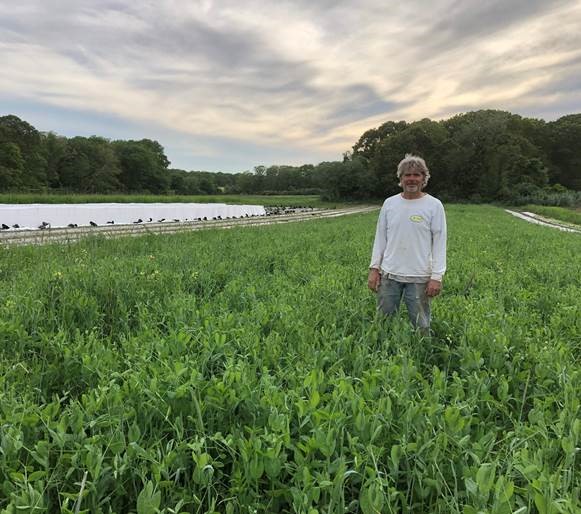 Soil Health Field Walk at Island Grown Initiative
Soil Health Field Walk at Island Grown Initiative
Monday, Oct 2, 2023
Island Grown Initiative Farm, 80 Stony Hill Road Vineyard Haven, MA
Join Island Grown Initiative and American Farmland Trust for a field walk exploring innovative approaches to tillage reduction on organic farms. Farmers Andrew Woodruff and Tim Connelly will provide a whole-farm tour focusing on their soil health and regenerative farming practices. During the tour, Andrew and Tim will showcase the custom zone builder they’ve built and the demonstration plots where they have used it to plant low-till fall brassicas into crimped and tarp-terminated rye, vetch, and crimson clover cover crop mix. They are tracking yield outcomes, labor investments, compaction, weed suppression, and other soil health indicators in the trial field. Andrew, Tim, and soil health advisor Alli Fish will discuss the soil health and crop performance outcomes of their tillage reduction trial. We will round out the afternoon with an informal farmer-to-farmer Q&A and discussion.
If you plan to bring your car to the island, make a reservation as far in advance as possible (as tourist demand is high). Contact Julie Fine (link Jfine@farmland.org) if you wish to arrange a carpool with other attendees. Arrive at the ferry terminal at least 30 minutes prior to departure and plan on a 45-minute ferry ride. If you plan to take the ferry as a passenger, you can park at the Woods Hole ferry terminal. Contact Andrew Woodruff (774-563-8197) for transportation from the Vineyard Haven ferry terminal to the farm. A link to the ferry schedule and tickets is here.
About the Farm:
Island Grown Initiative, a non-profit organization that works to build a regenerative and equitable food system on Martha’s Vineyard, has been transitioning its 40-acre farm to low- and no-tillage regenerative agricultural practices, utilizing tarps, landscape fabric, year-round, diverse cover crops, and multi-species rotational grazing. The farm also includes a 30,000-square-foot glass greenhouse, a ten-month CSA, a robust gleaning program, and frequent field trips from local schools. Approximately 1/3 of the food grown is donated to islanders in need through food equity programs and through partners in the Island Food Equity Network.
Speakers:
Andrew Woodruff has been farming vegetables on Martha’s Vineyard since he started Whippoorwill Farm in his teenage years. In 2017, after many decades of growing, Andrew decided to lease out Whippoorwill Farm and work as a consultant for local farms promoting soil health using regenerative systems. This journey has allowed Andrew to radically rethink land stewardship and how to grow food sustainably.
Tim Connelly hails from Schenectady, New York, and has worked for farms and environmental education programs around the Northeast. He moved to the Island in 2013 and served as Education Director of The Farm Institute for three years while working brief stints at numerous Island farms. Tim joined IGI in 2017 as Program Manager of Island Grown Schools and now is the Farm Director at the IGI farm, overseeing all of our farming operations and regenerative agriculture work. Tim hopes to use soil to heal humanity’s woes, but in the meantime, he’ll settle for providing the Island with as much nutritious and ethically produced food as possible.
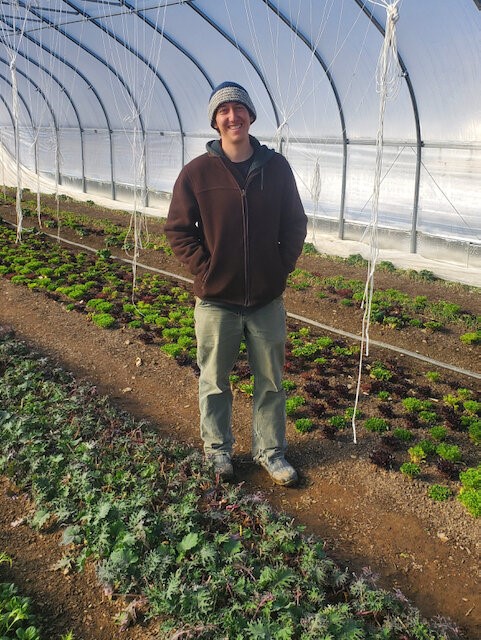 Soil Health Field Walk at Andrews Farm
Soil Health Field Walk at Andrews Farm
Monday, August 7, 2023
183 West Hill Road, Gardiner, ME 04345
Join Andrews Farm and American Farmland Trust for a field walk exploring innovative approaches to tillage reduction on organic farms. Farmer Mike Perisho will showcase his four-year minimum tillage rotation:
- Year 1: Onions mulched with aged leaves which are then raked to pathways after harvest and winter rye/vetch sown on bed tops;
- Year 2 Rye/vetch crimped/tarped for fall brassicas;
- Year 3: Residues raked into pathways for carrot and salad green successions;
- Year 4: Beds raised using BCS (2-wheel tractor) rotary plow and covered with wide landscape fabric with permanent holes for peppers, eggplant, and summer cucurbits.
Mike will provide a whole-farm tour and will discuss the operations involved in the trial rotation, elaborating on his initial soil health, weed suppression, and crop performance observations. We will round out the afternoon with a lightly-moderated farmer roundtable sharing session on what soil health and climate adaptation practices participants are exploring on their farms.
Speakers
Mike Perisho began growing vegetables on his wife Jess’s family land in 2014, which had been farmed by her family since the late 1800s. This fifth-generation effort is keeping the land in agriculture while involving family members, friends, and neighbors in the stewardship of the land. Mindful of how their activities affect life downstream, the farm team takes any opportunity to work with nature, rather than intervene against it, through the use of practices that preserve soil structure and maintain high levels of biological activity.
Julie Fine, New England Climate and Agriculture Specialist for American Farmland Trust has worked on dairy and vegetable farms in MA, CA, and New Zealand over the last 20 years before settling in western Massachusetts. In 2018, she earned an MS in plant and soil science from the Stockbridge School of Agriculture at UMass Amherst researching the effects of winter-killed cover crops on nutrient cycling, weed suppression, and soil health. Through relationships with farmers across the Northeast, Julie has seen the agricultural and climate challenges that food producers face and is dedicated to working together toward site-specific solutions for climate adaptation, soil health, and sustainable food production.
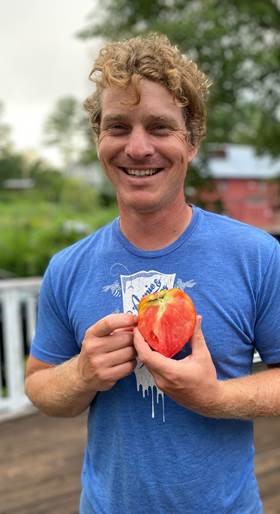 Soil Health Field Walk: Crimson & Clover Farm
Soil Health Field Walk: Crimson & Clover Farm
Monday, July 17th, 2023
215 Spring St, Florence, MA 01062
Join Crimson Clover Farm and American Farmland Trust for a field walk exploring innovative approaches to tillage reduction on organic farms. Farmer Nathan Frigard will showcase three tillage reduction and soil health trials: zone-tilling and planting crops into established dutch white clover living mulch, growing teff as a living mulch between tomato beds, and the use of intensive cover crop successions for organic matter/residue building. Nathan will provide a farm tour, stopping at each trial plot to discuss the operations involved and any initial soil health, weed suppression, and crop performance observations. We will round out the afternoon with an informal farmer-to-farmer Q&A and discussion.
Speakers
Nate Frigard co-founded Crimson & Clover Farm in 2011 with a mission to provide quality products, build healthy soils, and create a vibrant community farm where folks could come to not just pick up their CSA vegetables but also walk the land, pick strawberries, and flowers, see their neighbors, and learn where their food came from. For Nate, farming has always been about more than just growing great food but also building connections with nature and among people.

